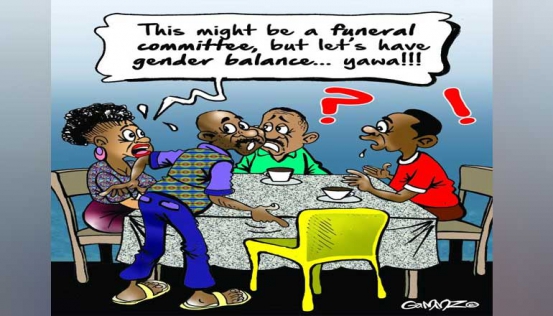
“Hey, we need gender here?” I was attending an afternoon meeting at a sub-location resource centre. It was a large room arranged in the manner of a classroom. The convenor addressed us as though he were campaigning for our votes. He was a man of average height and build, dressed smartly in a checked shirt and a blue tie.
The resource centre was part of an initiative to “empower rural communities towards income generating opportunities and bring an end to extreme poverty”. I learned that quorum was never an issue. The people living in villages did not dither around the chance of opportunity. The programme was run under the stewardship of an international NGO based in New York and my village was on the periphery of a cluster of villages selected to benefit from donor funding.
We became beneficiaries of an outreach set up, to spread the new knowledge of modern agriculture and the promise of immediate prosperity. The room was full of majorly men and a handful of women. We sat quietly and listened attentively. The convenors plea was for us to come together. He appealed to our greed and self-interest. “Donors do not give money to individuals. We have to be a group”.
He went on to talk about some two farmers who had made serious money. They were now doing very well. He reiterated the folly of disunity and gave this as the reason why “our brothers from mount Kenya succeed in business”. No one contested his point. We silently acknowledged the collective shame of our petty divisions that held us back from riches.
Gender balance even in funeral planning committee
We were told that we had to be registered as an organisation in order to qualify for the money. As a show of commitment, each one of us had to pay the registration fee that he suspected, “Would not be more than a five hundred shillings”. Receipts would be provided for reassurance. A small committee was then constituted, to form new members of the executive. Members of each specific village were asked to avail a single rep.
One of their main roles would be to comb through their respective village to urge more people to register especially grandmothers and widows. A few names were proposed and the individuals asked to stand up so that everyone would see them. The convenor got each one to introduce themselves to the gathering. It was at this point that one, older gentleman, donning a stylish hat, pointed out the anomaly, “Where is gender here?”
And someone else added, “Yes, gender is missing here”. Indeed, there were no women in the line-up of seven nominated officials. Three young women were immediately proposed to join the executive unopposed because they were a clear minority. I started to notice that the word “gender” had entered into frequent usage in my regular trips to the village in Gem, Siaya County over the last 5 years.
It was a word that has become synonymous with women’s equality. In spaces that were formerly dominated by men, the automatic inclusion of women has become the progressive approach to governance of village affairs, in church and even in funeral planning committees. The early influences of ‘poverty eradication’ NGOs that prioritised women’s groups may be introduction for the use of word of ‘gender’. However, it is the organisation of rural women reclaiming their role in governance of their affairs that has caused this paradigm shift.
Explanation for vitriolic reaction to feminisms
Men like the older gentleman in a white shirt who spoke up understood the dynamics of the time and the limitation of some cultural practises. Women drive the rural economies and their inclusion in governance was a basic necessity as opposed to an act of charity. Many Kenyan men are pro-feminist, like this gentleman, but they would never identify with the term.
The vitriolic reaction to the word feminism from both men and women is because feminism is seen as an elitist and pro-western concept that refuses to acknowledge the African cultural identity, beliefs and lived experience. It is a word now used interchangeably with ‘man-hating-angry-woman-preaching-western-ideology’.
Feminism is merely the conviction that men and women should have equal rights and opportunities. It is the action of speaking out against social practises that keep women and men locked in roles that are considered harmful. I come from the school of thought that believes men can find solidarity with African feminism without being in denial of the struggle of masculinity. The rigid social constructions of gender oppress both sexes, but an honest man will admit that women have borne the brunt of discrimination.
Where men do not accept their dominance as a gender, in society they are more likely to criticise a woman speaking out about gender equity as a rabble rouser. Many take the self-righteous position of denying a woman’s experience and dismissing her anger as ‘emotions’.
But in places like my village, I have witnessed the awakening of a popular feminism movement that started with the simple question, “Where is gender here?” and everyone seems to understand that all we are talking about is fair treatment and respect of women. It’s all about equity not equality because the latter is almost unachievable.
 The Standard Group Plc is a multi-media organization with investments in media
platforms spanning newspaper print
operations, television, radio broadcasting, digital and online services. The
Standard Group is recognized as a
leading multi-media house in Kenya with a key influence in matters of national and
international interest.
The Standard Group Plc is a multi-media organization with investments in media
platforms spanning newspaper print
operations, television, radio broadcasting, digital and online services. The
Standard Group is recognized as a
leading multi-media house in Kenya with a key influence in matters of national and
international interest.
